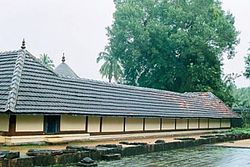Biography
Appu Marar could make the edaka speak, Tabla maestro Zakir Hussain said once [3]



Appu Marar was born in 1928, at Pallavur, a small hamlet in Palakkad district, in the south Indian state of Kerala, to Shankaran Marar and Ammini. [4] His father, a nomad, left the young Appu and his mother, when he was one year old, throwing the family into poverty. [5] Ammini was forced to remarry Subramania Iyer, and had two more sons, Manian and Kunhikuttan, who, years later, completed the Pallavur trio. [2]
Appu started learning traditional percussion instruments at a very young age and had his arangettam (debut) on chenda, at Pallavur Shiva Temple, the age of 8. He, soon, became adept at playing chenda, edeka and timila, under the tutelage of Thiruvilvamala Kondaswami and Parathuveettil Nanu Marar. [6] Appu Marar saw his father for the first time, when he was 17 years old, by which time, he had already mastered those traditional percussion instruments and had started performing at various temples in Kerala. [2] [7]
By the time, Appu Marar died in a private hospital in Palakkad at 4.00am on 8 December 2002, [8] due to age related illnesses, he had already performed at many stages including in Russia and at 47 Thrissur Poorams and 60 Nemmara Velas. [9] He performed, without break, at Thrissur pooram, heading the panchavadyam for Paremekkavu Devaswom from 1960 till his death in 2002. [7]
The legacy of Appu Marar lives on through his numerous disciples, who are active at the temple festivals across the state. His son, Kunissery Chandran, is also a known Maddalam exponent. [2] However, the most notable contribution of Appu Marar remains the style of panchavadyam, he, along with his brothers, have created, the Pallavur style. [9]




